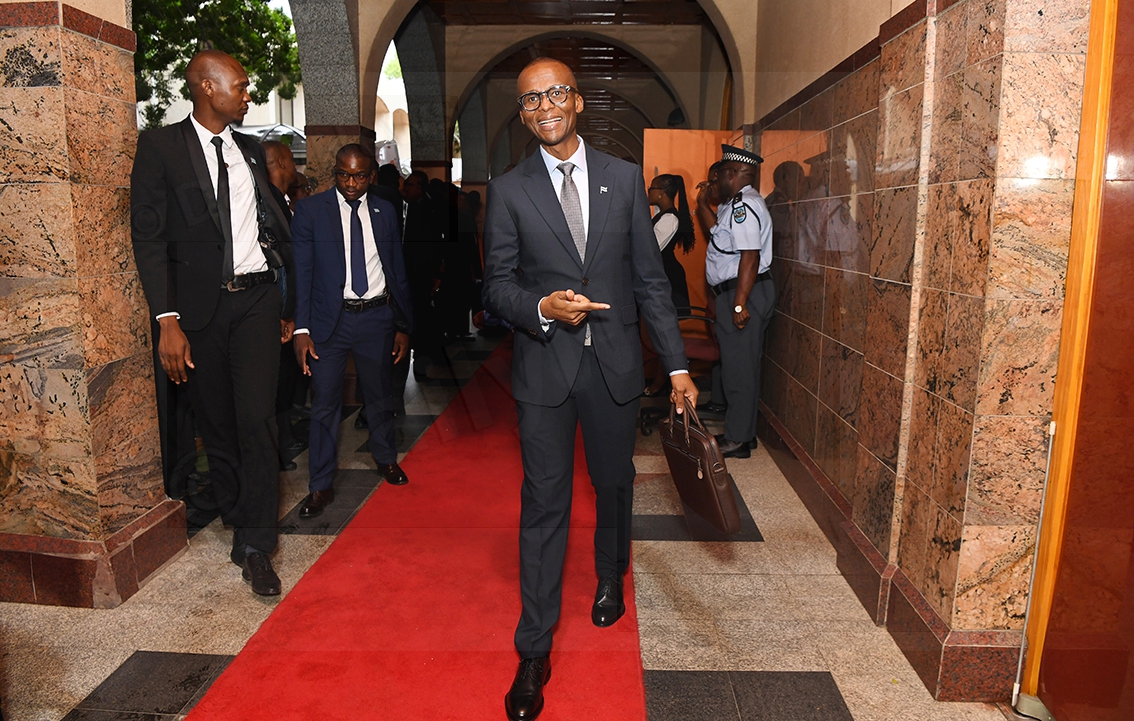Government adopts strict financial management
10 Feb 2025
In an effort to rebuild the country’s economy, government will halt the financial haemorrhage by focusing at its systems, strengthening oversight institutions and private sector and society.
Vice President and also Minister of Finance, Mr Ndaba Gaolathe said this when presenting budget proposals for the 2025/2026 financial year in Gaborone today.
Mr Gaolathe expressed concern that the state of the public financial management systems, practices and process had deteriorated over the years.
This, he said was evident in systems for prioritisation of development projects, procurement, implementation of potentially game changing mega-projects, monitoring of projects, transparent payments and informed and fair economic decision-making.
“This dysfunctionality has contributed to persistent financial losses in the recent past and manifested in a culture of regular supplementary budget requests,” he said.
To correct the situation, Mr Gaolathe said in the immediate term, government would repair and restore discipline in the process of supplementary budgets.
Going forward, he said supplementary budget requests, if any, would also strictly cater for unforeseen requirements or emergencies and would be catered for by budget cuts in other parts of the existing budget.
This approach, he said, would ensure that taxpayer funds were not merely diverting into a black hole, but instead creating tangible value for every Pula expended.
“It has further been observed that there is failure by some procuring entities to observe Public Procurement legislation requirements put in place to guard against depletion of funds before all contracted suppliers are paid,” he added.
The general practice of issuing Commitment Letters instead of Government Purchase Orders, the finance minister said would be stopped forthwith, as it was against the philosophies of prudent financial management.
To protect and nurture local businesses, he said government had also made an undertaking to ensure timely payment of suppliers stressing that it was imperative that appropriate procurement principles were followed at all times during procurement of goods, services and supplies.
The new administration, he said was determined to cultivate a new culture of fairness, diligence, an agile government, urgency, wealth creation, innovation, speed service and collective effort.
The new culture, he said, had inspired work which had already begun to mobilise resources by way of a new efficiency within the government system.
This Efficiency In Process Initiative, the minister said would drive revenue collection across Ministries, Departments and Agencies (MDAs) by comprehensively overhauling guidelines of fees or levies of government services.
“We expect that a comprehensively modernised and structured government, and local government, services ecosystem, including fees for work permits, visas, property rates, licences and a raft of other services should add significant amounts to our national coffers,” said Mr Gaolathe.
The Efficiency In Process Initiative, he said would address existing revenue leakages across all sectors of the economy, which included the significant amount owed to local authorities at about P765 million in property rates and P27.9 million in service levies.
Furthermore, he said local authorities revenue collection remained inefficient, with an average collection rate of 56 per cent of the target over the 2023/2024 and 2024/2025 financial years.
Other losses, the minister said emanated from mismanagement of contracts, such as leasing government land and facilities to companies or private individuals.
Due to unavailability of enablers, such as point of sale machines, connectivity and manpower shortages, the minister said evidence had showed that government collected an average of P119 million over the 2022/2023 and 2023/2024 financial years, against the P210 million targeted revenues of park entry fees.
Similarly, he said government also experienced leakages through lapses in controls resulting in salary overpayments which for the financial years ending March 2021 and 2022 recorded P27.7 million on average.
Therefore, he said the Efficiency In Process Initiative would help address the leakages and drive revenue maximisation across MDAs.
With a view to strengthen oversight institutions, Minister Gaolathe said government was also advancing a plan to strengthen the procurement model through a new approach in response to the procurement practice.
He expressed concern that the current procurement practice had been plagued by opaqueness, unfair practices, financial leakages and signs of systemic corruption.
“We have determined that the Public Procurement Regulatory Authority (PPRA) has not been able to fully execute its essential role. In the New Botswana, we view this institution as a strategic State-Owned Enterprises with a key role in promoting fairness and transparency in government procurement,” he added.
Additionally, he said a seamless access to procurement opportunities was being created through development of the Public Procurement Data Portal, which would serve as a centralised, real-time data sharing platform for the management and dissemination of procurement information, ensuring its accessibility to all stakeholders.
As part of revitalising the PPRA towards pursuing its legislative mandate, Mr Gaolathe said the commencement of the work had already been facilitated, along with other oversight agencies- towards the conduct of comprehensive audits of the projects under the Development Manager model, the Central Medical Store, as well as other infrastructure projects at key SOEs.
He explained that the audits would be carried out in two phases, with the first phase focusing on value, procurement processes and procedures as well as legal compliance, whilst the second phase would discern the areas that required more specialised financial forensic audit. ENDS
Source : BOPA
Author : Bopa
Location : Gaborone
Event : Parliament
Date : 10 Feb 2025





